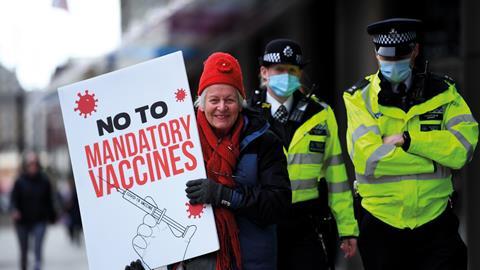‘No jab, no job’. It’s the latest phrase to enter the pandemic lexicon, joining the likes of ‘covidiot’, ‘Blursday’ and ‘squash the sombrero’.

As vaccine coverage steadily spreads beyond older retired folk to the working masses, employers are daring to dream of a fully protected workforce and a return to something nearer to business as usual. And yet, there is worry.
Despite the obvious benefits of the vaccine, high take-up is not guaranteed. An Oxford University study of more than 5,000 UK adults reported in December that 16% of the population were ‘very unsure’ about receiving the vaccine, while another 12% were likely to delay or avoid getting vaccinated. In the social care sector, a third of staff have not taken up the offer of vaccination.
So the question in many employers’ minds is whether they can compel staff to be vaccinated. Have the jab or no longer have a job? The answer is not straightforward.
Shakeel Dad, partner at Addleshaw Goddard, explains: ‘An employer can’t force someone to take the vaccine – that would breach section 45 of the Public Health (Control of Disease) Act 1984. But it’s about whether you can make having the vaccine a condition of employment – and whether that would be a reasonable and lawful condition.’
Health and safety
The Health and Safety at Work etc Act 1974 could potentially come into play, as it imposes a duty on employers to reduce workplace risks, which might stretch to insisting that staff are vaccinated. But whether or not such a forthright step is justified will very much depend on the circumstances, not to mention the science.
David Whincup, partner at Squire Patton Boggs, explains: ‘There’s a piece of the puzzle that still needs to be completed which will have an enormous impact on this issue: does having the vaccine reduce the likelihood that an employee will transmit the virus to others? If it does, the employer’s hand is greatly strengthened.’
Simon Rice-Birchall, partner at Eversheds, says: ‘Let’s say the vaccine doesn’t reduce transmission; then not being vaccinated is just a risk to myself, not to anyone else. But if my failure to vaccinate causes me to potentially spread the virus, then I’m a risk to others. You can see a massive gulf between these positions.’
He adds: ‘But say that in my workforce, I’m one of only a very few who are not vaccinated. So if I can only transmit to them, does it matter?’
Even if the vaccine is shown to reduce the virus’s ability to spread (as early studies have suggested), views differ on whether employers can oblige staff to take it. Lewis Silkin partner Sean Dempsey warns: ‘The struggle that employers will have is that the government itself is not mandating it and neither is the NHS – the biggest employer.’
Hannah Netherton, partner at CMS, agrees: ‘There are no signs that the Covid jab will be mandatory for front-line NHS staff, so that raises the question as to whether it would really be reasonable for other employers to make it compulsory on health and safety grounds.’
But Whincup points out that it would be ‘politically difficult’ for the government – or a public body such as the NHS – to impose mandatory vaccination. ‘Whether the NHS does or doesn’t do something, doesn’t affect the duties of an individual employer in their own circumstances,’ he insists.
For Whincup, the gravity of the risk involved and the ability (if borne out by the science) of a vaccine to reduce that risk to other employees mean that ‘as a reasonable starting point’, obliging employees to be vaccinated would probably be considered a ‘reasonable management request’ – as long as it is not imposed in a blanket way without any exceptions where needed. But Whincup concedes that an employer’s argument is weaker in some settings – such as an office environment – than in others.
Different roles, different rules
So where will employers have the strongest case for imposing a requirement to vaccinate? Social care, which involves contact with vulnerable elderly people, is surely top of the list. Frozen and chilled environments, such as meat-packing plants, have seen high numbers of Covid cases and would be another obvious area.
The move would also have greater justification for roles that involve going into people’s homes, be it for selling, cleaning, installing or repairing – and indeed Pimlico Plumbers boss Charlie Mullins has said his company plans to draw up ‘no vaccine, no job’ contracts for its 400-strong workforce.
Where an employee needs to travel abroad for work, the employer may also be on firmer ground, given that proof of vaccination may be needed to travel on some airlines – as suggested by Australia’s Qantas – and to enter some countries. But if the staff member has been successfully managing the role from home for the past year, there will be a question mark over whether travel is really such an essential aspect of the job.
What about the office setting? Here, the logic that obliging staff to have the jab would make the workforce safer is much weaker, because employers should have already reduced the Covid risk quite successfully in other ways – by having more staff working from home and fewer people in the office at any one time, and making social distancing achievable, for example.
The legal profession, which switched so seamlessly to remote working at the start of the pandemic, is a good example of a sector where employers would be foolhardy to attempt to impose a vaccination requirement. But might the arguments be different in, for example, the criminal law, where lawyers still need to turn up at court, and in prisons and police stations?
Netherton suggests not, as ‘all these venues should be ensuring that they are “Covid secure”,’ although she concedes that it does not always work perfectly in practice.
Regardless of sector, Dad cautions against the notion that obligatory vaccination should be a ‘business-wide policy’. It would need a ‘close examination of each individual role’, he stresses.
For Dempsey, the employer’s detailed risk assessment will be crucial and individual circumstances must be taken into account.
‘If someone has medical reasons for not taking the vaccine, it would not be reasonable to say, “you’re not taking the vaccine, so you’re done”,’ he points out.
He says an employee might potentially have religious objections to the vaccine – for example, if it contained animal products or ethanol.
‘But the policy may still be justifiable in the circumstances; it will come down to the employer’s risk assessments,’ he explains. ‘For example, it may be possible to say, “We’re sympathetic to your views, but we need a minimum of 80% of people to have had the vaccine [to deal with] this risk… As we’ve got three people who can’t have it for medical reasons, this would leave us with only 60%”.’
The employer would also need to look at other ways of reducing risk – for example, changing the shift patterns of employees or moving them to different roles.
'We’re likely to see these cases being brought in the coming months and I wouldn’t want to be the first employer that takes it on'
Discrimination danger
A big danger for employers that are too heavy-handed about requiring vaccination is their exposure to discrimination claims under the Equality Act 2010. The EA might apply if the employee’s reason for refusing to be vaccinated stems from a medical condition that amounts to a disability, from their religion or from a ‘philosophical’ belief. The big question is whether ‘anti-vaxxers’ could successfully launch a claim under this last category; many would certainly be keen to showcase their views in a courtroom.
To qualify under the act, an anti-vaxxer would need to show they held a genuine, important, cohesive belief that relates to a ‘weighty and substantial aspect of human life’. Last year, the Employment Tribunal held that ‘ethical veganism’ was capable of protection under the EA. So could the same be true of an anti-vaccination stance?
Dad says: ‘On balance, I think it’s unlikely to succeed. But we are seeing a broadening of what amounts to a philosophical belief, so I wouldn’t be confident of discounting it off the bat. We’re likely to see these cases being brought in the coming months and I wouldn’t want to be the first employer that takes it on.’
Whincup points to a further criterion under the act – the belief would need to be ‘worthy of respect in a democratic society’. He doubts anti-vax views would overcome this hurdle, particularly as the World Health Organization has identified vaccine hesitancy as one of the top 10 threats to human health.
But there is still the option of an unfair-dismissal claim. Whincup adds: ‘The arguments will be around whether [requiring vaccination] was a reasonable management request. An anti-vaxxer can only say that it wasn’t a reasonable request if they can cast doubt on the effectiveness of the vaccine to prevent the spread of infection. But if that’s the way that the medical evidence goes, their case will be a lot stronger.’
New starters
If seeking to ensure the current workforce is vaccinated against Covid is a potential litigation minefield, at least the dangers are less abundant when it comes to new starters. Dad explains: ‘With a new contract, it’s definitely easier. Once you’re an employee, there is generally an imbalance of power. But when you’re taking the job, you’re not compelled to do that job. So there is more latitude [in what the employer can put in the contract].’
But the type of setting and the level of Covid risk will still come into play. ‘For office environments, it will be quite difficult, even for new hires,’ predicts Dad. ‘The office is pretty far down the list in terms of the type of workplace where you can lawfully make vaccination a condition of employment.’
Views differ on the best approach for employers to take in relation to their existing staff. Rice-Birchall muses: ‘Will things change over time? I can imagine that it will become more socially unacceptable not to be vaccinated – a sense that: “You’re not pulling your weight for society.” But for now at least, for employers, it should be about strong encouragement, seeing to it that information is provided that is accurate and timely, and preventing the spread of disinformation. That’s as far as employers should be going.’
But Whincup asserts that employers can be ‘more robust in most cases’ than they have been so far. He predicts: ‘Maybe they will keep an eye on the take-up rate for the vaccine. If take-up across the population is very high, employers might not feel the need to push this. But if the take-up rate is low, so there’s a reasonable chance that their employees haven’t had the vaccine, then they can and should insist.
‘If that means that people who won’t take the vaccine – who do not have good reasons – lose their jobs, that’s probably just a measure of the gravity of the public health problem. It’s not just about the employee – it’s about protection of the greater public.’
Rachel Rothwell is a freelance journalist and Gazette columnist
































2 Readers' comments